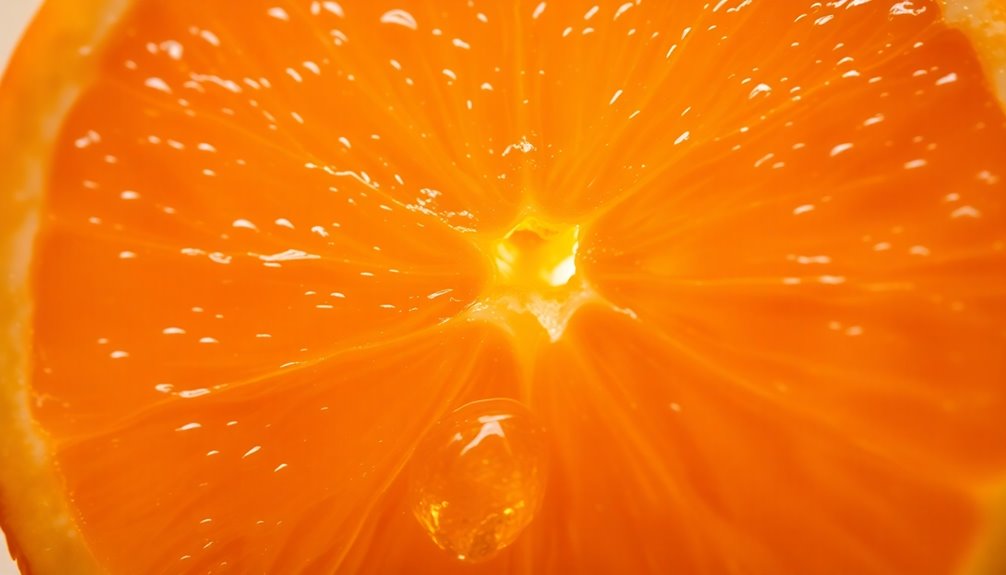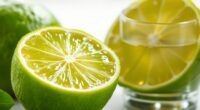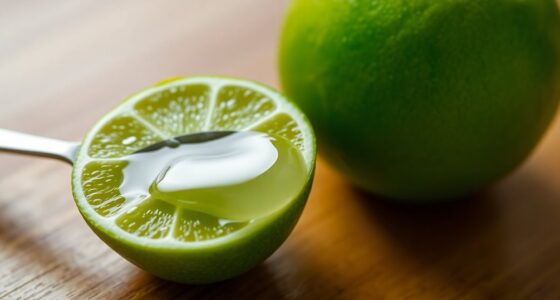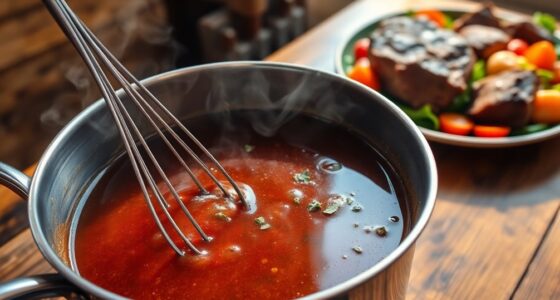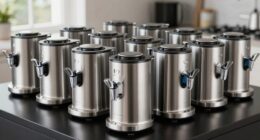A medium-sized orange gives you about 4 to 5 tablespoons of juice, which is around 1/4 to 1/3 cup. So, if you're aiming for a full cup of juice, you'll need about three of those oranges. Keep in mind that the type of orange you choose and how fresh they are can affect your yield. Stick around, and you'll discover more tips on maximizing your juice extraction and the best oranges to use!
Key Takeaways
- A medium-sized orange yields about 4 to 5 tablespoons of juice, roughly 1/4 to 1/3 cup.
- On average, three medium oranges are needed to produce a full cup of juice.
- Navel and Valencia oranges are known for their higher juice yield and better flavor.
- Freshness and ripeness of the orange significantly affect the amount of juice extracted.
- The juicing method used can influence the total volume of juice obtained.

Have you ever wondered how much juice you can squeeze from a single orange? If you're looking to whip up a refreshing glass of fresh orange juice, knowing the juice yield of different oranges can help you plan accordingly. A medium-sized orange typically yields about 4 to 5 tablespoons of juice, which translates to approximately 1/4 to 1/3 cup. So, if you're eyeing that delicious cup of fresh orange juice, you'll likely need about three medium-sized oranges to get there.
The type of orange you choose can significantly impact the amount of juice you can extract. For instance, Navel oranges and Valencia oranges are known for their juicy contents. If you're after a sweeter and more flavorful juice, you might want to lean towards these varieties. Their juice yield often exceeds that of other citrus fruits, meaning you can enjoy more fresh orange juice with fewer oranges.
So, when you're at the store, consider reaching for those Navel or Valencia oranges to maximize your juice output.
When you purchase oranges, it's helpful to keep in mind that a pound of oranges usually contains about two medium-sized fruits. This means that if you buy a pound, you can expect to yield approximately 8 to 10 tablespoons of juice. Knowing this can help you gauge how many oranges you need for your desired amount of juice.
If you're making a large batch of fresh orange juice for a gathering, just do the math: for every two medium-sized oranges, you'll get a decent amount of juice, and it won't take long to gather the three oranges you need for that full cup.
However, don't forget that environmental factors, freshness, and the juicing method can all influence the total juice output from an orange. If an orange is slightly overripe, it might yield more juice, whereas a firm, under-ripe orange could be a bit stingy. Additionally, the juicing method you choose—whether you're using a manual juicer or an electric one—can also affect how much juice you extract. Manual juicers might require a little more effort, but they can be quite effective in getting every last drop out of each citrus fruit.
Frequently Asked Questions
How Much Juice Comes From 2 Oranges?
When you juice two medium-sized oranges, you can expect to get around 8 to 10 tablespoons of juice, which is about 4 to 5 ounces. The amount of juice can vary depending on the juiciness of the oranges and their ripeness. If you’re curious about how much juice from one orange, typically, you can expect to extract about 4 tablespoons, roughly equivalent to 2 ounces. This makes oranges a convenient choice for adding fresh juice to recipes or drinks without needing a large quantity.
The actual amount may vary depending on the size and ripeness of the oranges.
If you want to maximize the juice extraction, using a citrus squeezer will help you get the most out of your oranges.
How Many Oranges Make 8 Oz of Juice?
Oranges offer outstanding output! To whip up 8 oz of refreshing orange juice, you'll need about four medium-sized oranges.
Each orange typically gives you around 2 oz of juice, so gathering four gets you that perfect pint.
Remember, the juiciness can vary based on size and ripeness, so pick fresh, vibrant oranges for the best results.
Enjoy your delicious drink and savor the sweetness you've squeezed from those fruits!
How Much Juice Does One Navel Orange Yield?
One navel orange typically yields about 4 to 5 tablespoons of juice, which is roughly 1/4 to 1/3 cup.
If you're planning to make a refreshing drink, you'll find that for one cup of orange juice, you'll need around three navel oranges.
How Many Oranges Does It Take to Make 16 Oz of Juice?
To make 16 oz of orange juice, you'll need about 6 to 12 oranges, depending on their size and juiciness.
If you're using medium-sized oranges, you can expect each one to yield around 2 to 4 oz of juice.
Opt for juicy varieties like Valencia or navel oranges to minimize the number you need.
It's smart to have a few extras on hand just in case some don't yield as much juice.
Conclusion
So, the next time you slice into that vibrant orange, picture the sunshine it holds within. Just imagine squeezing all that tangy goodness into your glass—usually about a half cup of juice, give or take. It's like capturing a bit of summer in every drop! Whether you're sipping it solo or mixing it into a refreshing drink, that burst of flavor will surely brighten your day. So go ahead, enjoy that citrus symphony!
Cindy thoroughly researches juicing trends, techniques, and recipes to provide readers with practical advice and inspiration. Her writing style is accessible, engaging, and designed to make complex concepts easy to understand. Cindy’s dedication to promoting the advantages of juicing shines through her work, empowering readers to make positive changes in their lives through the simple act of juicing.

